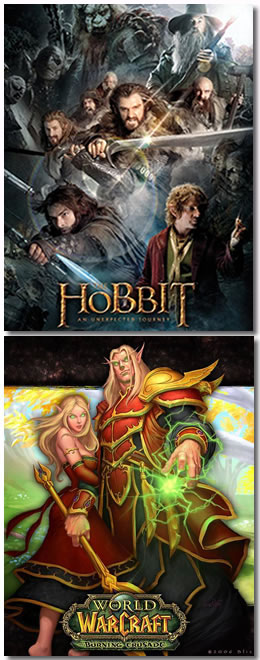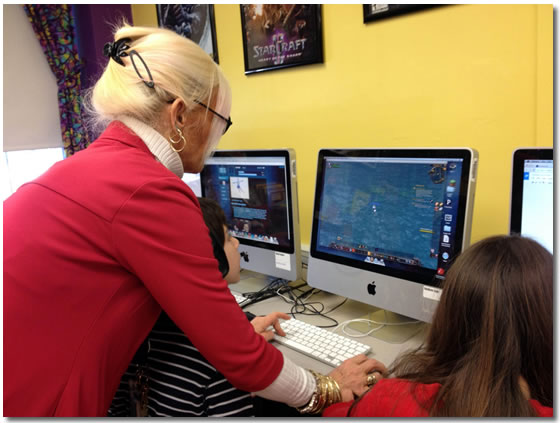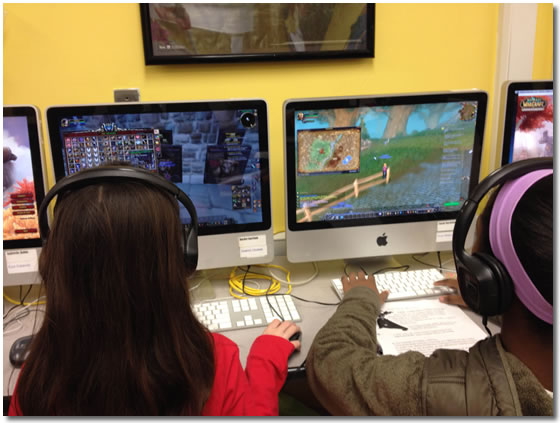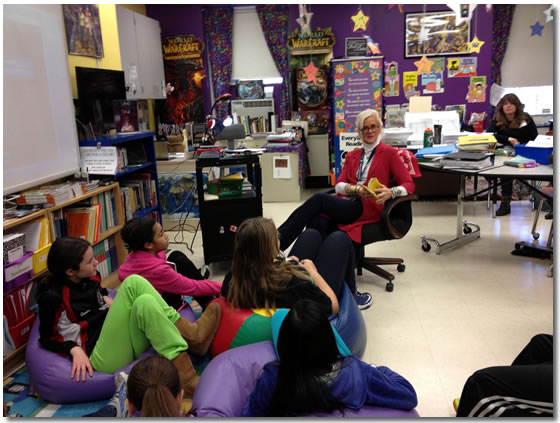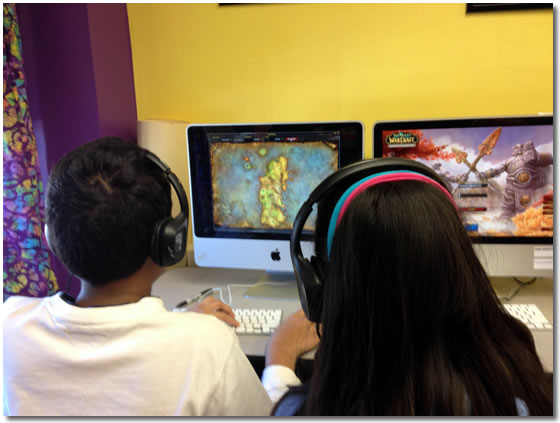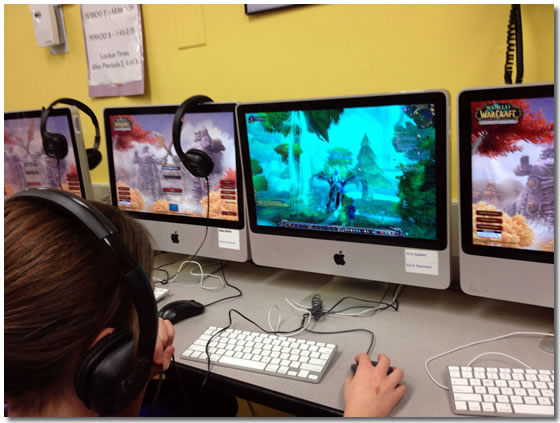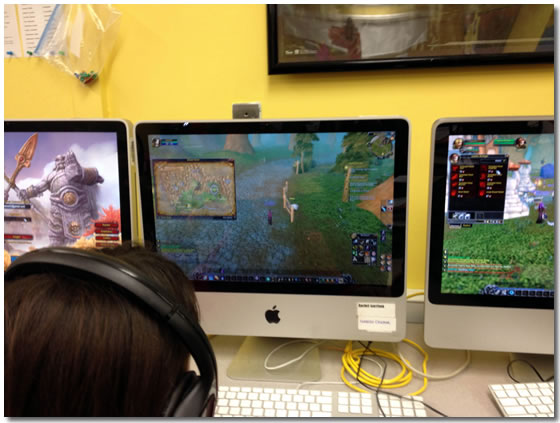QUESTS 1-36 GENERAL COMMON CORE ELEMENTS ADDRESSED
English Language Arts Standards » Reading: Literature » Grade 11-12
Key Ideas and Details
3. Analyze the impact of the author’s choices regarding how to develop and related elements of a story or dram (e.g., where story is a set, how the action is ordered, how the characters are introduced and developed.)
Integration of Knowledge and Ideas 11-12
9. Demonstrate knowledge of eighteenth-, nineteenth- and early-twentieth-century foundational works of American literature, including how two or more texts from the same period treat similar themes or topics.
Range of Reading and Level of Text Complexity 11-12
10. By the end of grade 12, read and comprehend literature, including stories, dramas, and poems, at the high end of the grades 11–CCR text complexity band independently and proficiently.
Speaking and Listening Standards 11-12
1. Initiate and participate effectively in a range of collaborative discussions (one-on-one, in groups, and teacher-led) with diverse partners on grades 11–12 topics, texts, and issues, building on others’ ideas and expressing their own clearly and persuasively. (Lore and Legend)
- Come to discussions prepared, having read and researched material under study; explicitly draw on that preparation by referring to evidence from texts and other
- Work with peers to promote civil, democratic discussions and decision-making, set clear goals and deadlines, and establish individual roles as needed.
- Propel conversations by posing and responding to questions that probe reasoning and evidence; ensure a hearing for a full range of positions on a topic or issue; clarify, verify, or challenge ideas and conclusions; and promote divergent and creative perspectives.
- Respond thoughtfully to diverse perspectives; synthesize comments, claims, and evidence made on all sides of an issue; resolve contradictions when possible; and determine what additional information or research is required to deepen the investigation or complete the task.
- Seek to understand other perspectives and cultures and communicate effectively with audiences or individuals from varied backgrounds
Language Standards 11-12
3. Apply knowledge of language to understand how language functions in different contexts, to make effective choices for meaning or style, and to comprehend more fully when reading or listening. (Hero's Journal)
- Vary syntax for effect, consulting references (e.g., Tufte’s Artful Sentences) for guidance as needed; apply an understanding of syntax to the study of complex texts when reading.
COMMON CORE STANDARDS BY QUEST
QUEST 1 – Standards Addressed
English Language Arts Standards » Writing » Grades 11-12
Text Types and Purposes
1. Write arguments to support claims in an analysis of substantive topics or texts, using valid reasoning and relevant and sufficient evidence. Explore and inquire into areas of interest to formulate an argument.
- Introduce precise, knowledgeable claim(s), establish the significance of the claim(s), distinguish the claim(s) from alternate or opposing claims, and create an organization that logically sequences claim(s), counterclaims, reasons, and evidence.
QUEST 2 – Standards Addressed
English Language Arts Standards » Writing » Grades 11-12
Text Types and Purposes
1. Write arguments to support claims in an analysis of substantive topics or texts, using valid reasoning and relevant and sufficient evidence. Explore and inquire into areas of interest to formulate an argument.
- Introduce precise, knowledgeable claim(s), establish the significance of the claim(s), distinguish the claim(s) from alternate or opposing claims, and create an organization that logically sequences claim(s), counterclaims, reasons, and evidence
QUEST 3 – Standards Addressed
English Language Arts Standards » Writing » Grades 11-12
Text Types and Purposes
1. Write arguments to support claims in an analysis of substantive topics or texts, using valid reasoning and relevant and sufficient evidence. Explore and inquire into areas of interest to formulate an argument.
- Introduce precise, knowledgeable claim(s), establish the significance of the claim(s), distinguish the claim(s) from alternate or opposing claims, and create an organization that logically sequences claim(s), counterclaims, reasons, and evidence.
Production and Distribution of Writing
6. Use technology, including the Internet, to produce, publish, and update individual or shared writing products in response to ongoing feedback, including new arguments or information.
QUEST 4 – Standards Addressed
English Language Arts Standards » Reading: Literature » Grades 11-12
Key Ideas and Details
2. Determine two or more themes or central ideas of a text and analyze their development over the course of the text, including how they interact and build on one another to produce a complex account; provide an objective summary of the text. (Hero's Journal - The Path Ahead)
Craft & Structure
4. Determine the meaning of words and phrases as they are used in the text, including figurative and connotative meanings; analyze the impact of specific word choices on meaning and tone, including words with multiple meanings or language that is particularly fresh, engaging, or beautiful. (Include Shakespeare as well as other authors.)
(Hero's Journal - The Path Ahead)
QUEST 5 – Standards Addressed
English Language Arts Standards » Reading: Literature » Grades 11-12
Key Ideas and Details
2. Determine two or more themes or central ideas of a text and analyze their development over the course of the text, including how they interact and build on one another to produce a complex account; provide an objective summary of the text.
Craft and Structure
4. Determine the meaning of words and phrases as they are used in the text, including figurative and connotative meanings; analyze the impact of specific word choices on meaning and tone, including words with multiple meanings or language that is particularly fresh, engaging, or beautiful. (Include Shakespeare as well as other authors.) (Hero's Journal - The Path Ahead)
QUEST 6 – Standards Addressed
English Language Arts Standards » Reading: Literature » Grades 11-12
Range of Reading and Level of Text Complexity
10. By the end of grade 11, read and comprehend literature, including stories, dramas, and poems, in the grades 11–CCR text complexity band proficiently, with scaffolding as needed at the high end of the range. By the end of grade 12, read and comprehend literature, including stories, dramas, and poems, at the high end of the grades 11–CCR text complexity band independently and proficiently. (Adventures in Azeroth - A Friend in Need)
English Language Arts Standards » Writing » Grades 11-12
Text Types and Purposes
2. Write informative/explanatory texts to examine and convey complex ideas, concepts, and information clearly and accurately through the effective selection, organization, and analysis of content. (Tavern Talk - 10 Rats - Writing Your Own Quest).
- Introduce a topic; organize complex ideas, concepts, and information so that each new element builds on that which precedes it to create a unified whole; include formatting (e.g., headings), graphics (e.g., figures, tables), and multimedia when useful to aiding comprehension.
- Develop the topic thoroughly by selecting the most significant and relevant facts, extended definitions, concrete details, quotations, or other information and examples appropriate to the audience’s knowledge of the topic.
- Use appropriate and varied transitions and syntax to link the major sections of the text, create cohesion, and clarify the relationships among complex ideas and concepts.
- Use precise language, domain-specific vocabulary, and techniques such as metaphor, simile, and analogy to manage the complexity of the topic.
- Establish and maintain a formal style and objective tone while attending to the norms and conventions of the discipline in which they are writing.
QUEST 7 – Standards Addressed
English Language Arts Standards » Writing » Grades 11-12
Text Types and Purposes
3. Write narratives to develop real or imagined experiences or events using effective technique, well-chosen details, and well-structured event sequences.
- Engage and orient the reader by setting out a problem, situation, or observation and its significance, establishing one or multiple point(s) of view, and introducing a narrator and/or characters; create a smooth progression of experiences or events.
- Use narrative techniques, such as dialogue, pacing, description, reflection, and multiple plot lines, to develop experiences, events, and/or characters.
- Use a variety of techniques to sequence events so that they build on one another to create a coherent whole and build toward a particular tone and outcome (e.g., a sense of mystery, suspense, growth, or resolution).
- d. Use precise words and phrases, telling details, and sensory language to convey a vivid picture of the experiences, events, setting, and/or characters.
- Provide a conclusion that follows from and reflects on what is experienced, observed, or resolved over the course of the narrative.
QUEST 8 – Standards Addressed
English Language Arts Standards » Writing » Grades 11-12
Text Types and Purposes
2. Write informative/explanatory texts to examine and convey complex ideas, concepts, and information clearly and accurately through the effective selection, organization, and analysis of content.
- Introduce a topic; organize complex ideas, concepts, and information so that each new element builds on that which precedes it to create a unified whole; include formatting (e.g., headings), graphics (e.g., figures, tables), and multimedia when useful to aiding comprehension.
- Develop the topic thoroughly by selecting the most significant and relevant facts, extended definitions, concrete details, quotations, or other information and examples appropriate to the audience’s knowledge of the topic.
- Use appropriate and varied transitions and syntax to link the major sections of the text, create cohesion, and clarify the relationships among complex ideas and concepts.
- Use precise language, domain-specific vocabulary, and techniques such as metaphor, simile, and analogy to manage the complexity of the topic.
- Establish and maintain a formal style and objective tone while attending to the norms and conventions of the discipline in which they are writing.
- Provide a concluding statement or section that follows from and supports the information or explanation presented (e.g., articulating implications or the significance of the topic).
QUEST 9 – Standards Addressed
English Language Arts Standards » Writing » Grades 11-12
Production and Distribution of Writing
4. Produce clear and coherent writing in which the development, organization, and style are appropriate to task, purpose, and audience. (Grade-specific expectations for writing types are defined in standards 1–3 above.) (Tavern Talk - Write Your Riddle!)
6. Use technology, including the Internet, to produce, publish, and update individual or shared writing products in response to ongoing feedback, including new arguments or information.
Vocabulary Acquisition and Use
5. Demonstrate understanding of figurative language, word relationships, and nuances in word meanings.
- Interpret figures of speech (e.g., hyperbole, paradox) in context and analyze their role in the text.
- Analyze nuances in the meaning of words with similar denotations.
QUEST 10 – Standards Addressed
English Language Arts Standards » Reading: Informational Text » Grades 11-12
7. Integrate and evaluate multiple sources of information presented in different media or formats (e.g., visually, quantitatively) as well as in words in order to address a question or solve a problem.
English Language Arts Standards » Grades 11-12
Production and Distribution of Writing
4. Produce clear and coherent writing in which the development, organization, and style are appropriate to task, purpose, and audience. (Grade-specific expectations for writing types are defined in standards 1–3 above.)
5. Develop and strengthen writing as needed by planning, revising, editing, rewriting, or trying a new approach, focusing on addressing what is most significant for a specific purpose and audience.
6. Use technology, including the Internet, to produce, publish, and update individual or shared writing products in response to ongoing feedback, including new arguments or information.
English Language Arts Standards » Language » Grades 11-12
Conventions of Standard English
1. Demonstrate command of the conventions of standard English grammar and usage when writing or speaking.
- Apply the understanding that usage is a matter of convention, can change over time, and is sometimes contested.
- Resolve issues of complex or contested usage, consulting references (e.g., Merriam-Webster’s Dictionary of English Usage, Garner’s Modern American Usage) as needed.
QUEST 11 – Standards Addressed
English Language Arts Standards » Writing » Grades 11-12
7. Conduct short as well as more sustained research projects to answer a question (including a self-generated question) or solve a problem; narrow or broaden the inquiry when appropriate; synthesize multiple sources on the subject, demonstrating understanding of the subject under investigation. (Tavern Talk - Taking the Hobbits to Azeroth)
8. Gather relevant information from multiple authoritative print and digital sources, using advanced searches effectively; assess the strengths and limitations of each source in terms of the specific task, purpose, and audience; integrate information into the text selectively to maintain the flow of ideas, avoiding plagiarism and overreliance on any one source and following a standard format for citation. (Tavern Talk - Taking the Hobbits to Azeroth)
9. Draw evidence from informational texts to support analysis, reflection, and research. (Tavern Talk - Taking the Hobbits to Azeroth)
- Apply grade 11-12 Reading standards to literary nonfiction (e.g., “Delineate and evaluate the argument and specific claims in a text, assessing whether the reasoning is sound and the evidence is relevant and sufficient; recognize when irrelevant evidence is introduced”). (Tavern Talk - Taking the Hobbits to Azeroth)
QUEST 12 – Standards Addressed
English Language Arts Standards » Language » Grades 11-12
Conventions of Standard English
1. Demonstrate command of the conventions of standard English grammar and usage when writing or speaking.
2. Demonstrate command of the conventions of standard English capitalization, punctuation, and spelling when writing.
3. Apply knowledge of language to understand how language functions in different contexts, to make effective choices for meaning or style, and to comprehend more fully when reading or listening.
- Vary syntax for effect, consulting references (e.g., Tufte’s Artful Sentences) for guidance as needed; apply an understanding of syntax to the study of complex texts when reading
